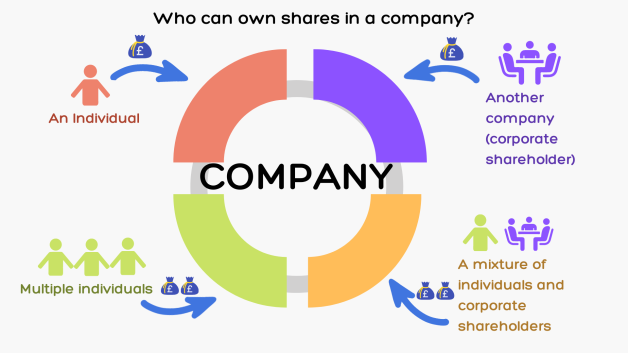A corporate shareholder is a company, partnership, trust or business entity that owns shares in another company. It is perhaps easiest to remember by simply stating that a corporate shareholder is a non-human shareholder.
The corporate shareholder company itself owns the shares, not any individual person or officer of the company. Shares are issued to it as if it were a natural person; there is no need for any joint shareholding arrangements or anything that differs from issuing shares to an individual. The corporate shareholder is entered in the register of members just as a human shareholder would be.
Maintain shareholder records with simple, intuitive software
Transfer shares
Maintain share certificates
Process dividends
And keep everything up to date with Companies House.
Corporate shareholders can be large institutional investors such as pension funds or investment firms, or smaller companies that hold shares in other companies as part of their business operations or investment strategy. They can be publicly traded companies, private companies, or even other subsidiaries of the same parent company.
A corporate shareholder has the same basic shareholder rights a human shareholder would, based on the prescribed particulars of the share class or classes it owns. For ordinary shares these rights are usually:
- The right to vote on ordinary, special and written resolutions
- To receive a share of the company’s profits via dividends (if the company is in a position to pay dividends)
- To be paid back some or all of their investment if the company is wound up, once its creditors have been paid off.
These shareholder rights can enable a corporate shareholder to have a role in the management of the company. The extent of that role is determined by the type and number of shares they hold. They may be able to influence important decisions such as the appointment of directors or the approval of major business transactions.
The corporate shareholder company will usually nominate one of its executives to participate in meetings, AGMs, and other business of the company in which it holds shares. In this capacity they act as a representative of the corporate shareholder by taking the actions a human shareholder would. This usually includes signing any relevant documents and forms on behalf of the corporate shareholder.
The representative is usually not a proxy shareholder. A corporate shareholder has the same right to appoint a proxy shareholder as an individual shareholder does. But since it is already understood that the representative is attending the meeting ‘in place of’ the corporate shareholder, there is usually no requirement to submit a form of proxy for the representative.
Corporate shareholder example
EFG is a company or organisation that buys 15% of the shares of HIJ, a limited company. EFG thus becomes a corporate shareholder in HIJ.
As a corporate shareholder, EFG now has a stake in HIJ’s success. If HIJ performs well, EFG might see a return on its investment in the form of dividends. This would be dependent on the company deciding to declare dividends, and many successful companies choose not to pay dividends. But EFG might still be able to make a positive return on its investment if it sells its shares at a profit following a rise in value. There is always the possibility that HIJ could perform poorly and EFG could make a loss from its investment.
In addition to its investment, EFG may have certain voting rights that allow it to influence HIJ’s decisions, such as the election of the board of directors or the approval of certain business strategies. This is the sense in which a company sacrifices a degree of control when it sells shares.
EFG decides to increase its stake in HIJ. It buys more shares to give it a 51% stake in the company. This makes it the majority shareholder and it also becomes the parent company of HIJ. HIJ has now become a subsidiary of EFG.
Advantages of having a corporate shareholder investing in your company
- Access to capital: Corporate shareholders can provide a significant amount of capital to a company, which can be useful for growth and expansion, research and development, and other business activities.
- Expertise and resources: Corporate shareholders may have expertise, experience, and resources that can be valuable to the company, such as knowledge of the industry, contacts, marketing skills, or access to new markets.
- Increased credibility: When a reputable company invests in your business, it can increase your company’s credibility and reputation in the eyes of customers, suppliers, and other stakeholders. It may also allow you to get favourable rates with suppliers, improved payment terms and other benefits.
Disadvantages of having a corporate shareholder investing in your company
- Loss of control: When a corporate shareholder invests in a company, it often expects to have a say in the company’s management and decision-making processes, which can lead to a loss of control for the original founders or shareholders.
- Pressure to perform: Corporate shareholders may put pressure on the company to perform well and generate returns on their investment, which can lead to short-term thinking and potentially risky business decisions.
- Disclosure requirements: Companies with corporate shareholders may be required to disclose additional information about their business operations and financial performance, which can be time-consuming and costly. The purchase of shares by the corporate shareholder may come as part of an investment agreement that contains further terms and conditions beyond the basic company/shareholder arrangement.
Raising funds by selling shares to corporate shareholders can be an attractive option for companies seeking to grow, develop and increase their market share. Whether or not a company wishes to go down this route will depend on their willingness or reluctance to give up a degree of control.
Maintain statutory books and stay up to date with Companies House.
Use Inform Direct to take the strain out of statutory filings.

